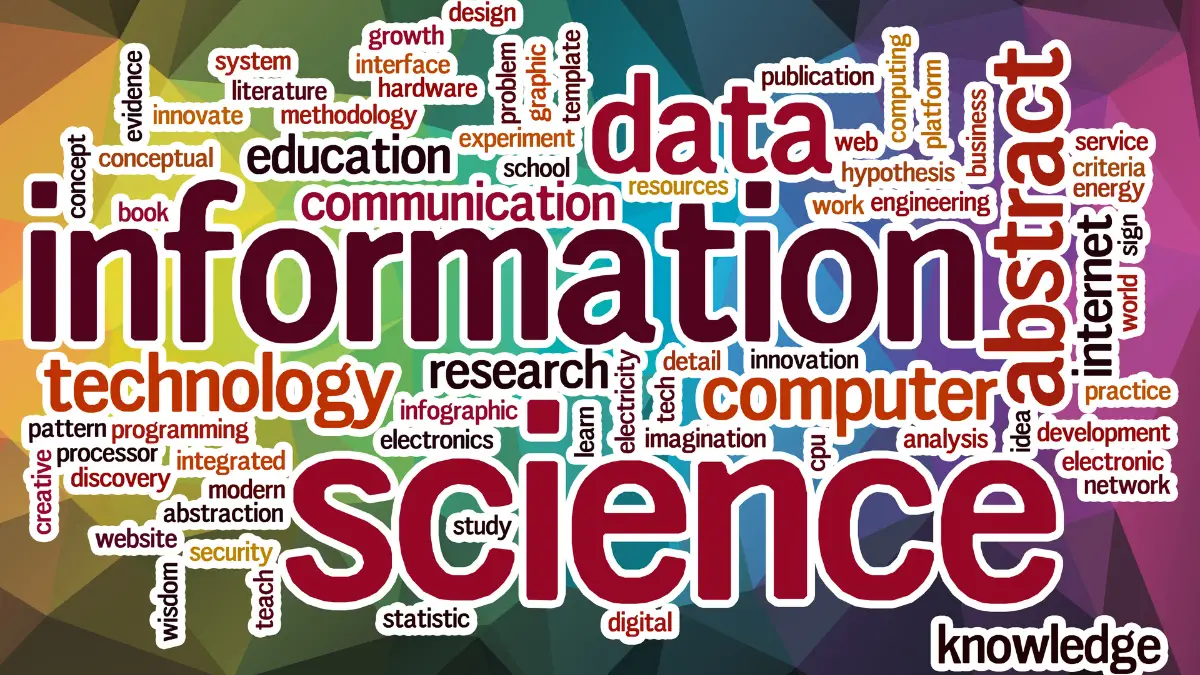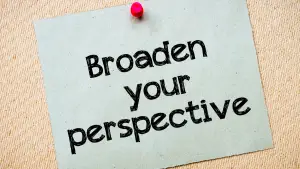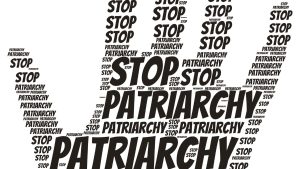Editorial Note
Thank you to our generous sponsors, Sociologists for Women in Society, Center for Equity Education, American Sociological Association’s Section on Sociological Practice & Public Sociology, Hartman Castle Preservation Corporation, Island Acres Resort Motel, Alpha Kappa Delta, Pacific Sociological Association, and the Association for Applied & Clinical Sociology for helping us make Applied Worldwide’s 2024 “Why is Sociology Important?” student essay competition a success!
This essay on the importance of sociology has been published on behalf of Applied Worldwide’s 2024 Global Student Essay Competition. For the 2024 competition, we awarded 16 student essayists across six countries and will be sharing each winning essay in our “Why is Sociology Important?” essay collection.
This sociology essay was written by Husseina Habiba Idris, a 2nd year student of library and information science at Ahmadu Bello University, Zaria, Nigeria and earned a 3rd place prize in the competition.
Sociology and its Role in Library and Information Science, Husseina Habiba Idris
Sociology is the discipline that studies human social structures and relationships. Sociology covers a vast range of themes, including crime, religion, the family, the state, racial and social stratification, common cultural beliefs, societal stability, and abrupt transformations in entire countries. Sociology seeks to understand how human action and consciousness shape and are shaped by the cultural and social systems that surround them. This insight integrates the study of these different topics.
Sociology is a fascinating and instructive study that investigates and illuminates important topics in our personal lives, communities, and the larger world. Sociology investigates the human origins and impacts of societal concerns such as romantic love, aging, racial and gender identity, family conflict, abnormal behavior, and religious conviction. Sociology investigates and clarifies social issues such as wealth and poverty, discrimination and prejudice, educational institutions, corporations, urban neighborhoods, and social movements. Sociology investigates a wide range of global topics, including migration and population increase, war and peace, and economic development.
Students who have received a thorough sociology education understand how to think critically about human social life and ask crucial research questions. They understand how to develop effective social research initiatives, acquire and evaluate empirical data, and create and present study findings. Students of sociology are also trained to assist others understand how the social world works and how it may be improved. In general, they have learned to think, evaluate, and communicate clearly, creatively, and effectively. All of these skills are extremely valuable in a wide range of occupational fields and professions
There is no doubt that sociology is a broad and comprehensive study that examines all aspects of human society and social structures. The importance of sociology to Library and Information Science cannot be overstated. As a Library and Information Science student, I learned about and took various sociological classes. Understanding the culture, society, structures, and culture shock of various societies is necessary for successful information transmission. Most of the time, I learned a few things from my elder brother, who is a sociology graduate from Ahmadu Bello University in Zaria, Nigeria. And, based on my research and lectures in sociology, I believe that understanding sociology is critical for information professionals and Library and Information Science students because it provides valuable insights into the social and cultural aspects of information creation, dissemination, and use.
In the context of information systems and services, social structures influence information accessibility, distribution, and use. This social structure comprises social interaction in society, including how people connect and communicate with one another in a social situation. This communication includes verbal and nonverbal conversations, collaboration, dispute resolution, and the building of social networks. Understanding social interaction can enable Lab scientists and professionals to better understand information behavior, information seeking patterns, and the dynamics of information exchange throughout communities.
Sociology, particularly socialization, is inextricably linked with library and information science. That is the lifelong process by which people gain knowledge, skills, attitudes, and values that allow them to perform effectively in society. This learning process includes understanding society norms, roles, and cultural practices, which is critical for Library and Information professionals. Library and Information scientists must learn to comprehend socialization, which plays an important role in enabling information and promoting personal and social growth.
Social change is a key topic and course in sociology. Sociology is a dynamic field that is constantly changing. Societal change can be influenced by a variety of variables, including technological breakthroughs, economic upheavals, and variations in societal values and beliefs. As a result, taking a sociology course will assist information workers become more aware of these social changes and adapt their services and systems to match their users’ changing information needs. By studying sociology, Library and Information Scientists gain a deeper understanding and dimensions that influence information systems and services, allowing them to critically examine the role of libraries as social institutions, understand the impact of inequalities on information access, and advocate for social justice and equity in information provision.
Every library and information professional understands that sociology provides a prism through which they can examine the societal consequences of information, as well as the role of information professionals in shaping and responding to these dynamics. However, sociological insights are important for librarians and information specialists. This approach, also known as Sociological Imagination, allows library and information professionals to perceive and analyze the world through a sociological lens. As a result, library and information professionals are encouraged to look beyond individual experiences and examine a broader social context in order to shape lives, interactions, and gain a better understanding of how social forces, structures, and institutions influence human behavior and shape society as a whole.
Sociology and Library and Information Science
Understanding the link between Sociology, Library, and Information Science is critical for information professionals because it helps us understand the social dimensions of our work and improves our ability to serve diverse people effectively. Sociology and library and information science are closely related since both seek to understand and address social problems. Let’s look at some crucial characteristics of this relationship.
Sociology sheds light on the social context in which information is generated, transmitted, and consumed. It teaches us that information is not neutral, but is influenced by social elements such as culture, power dynamics, and social institutions. Understanding the social context of information allows information professionals to provide more inclusive and relevant services that address the requirements of various communities.
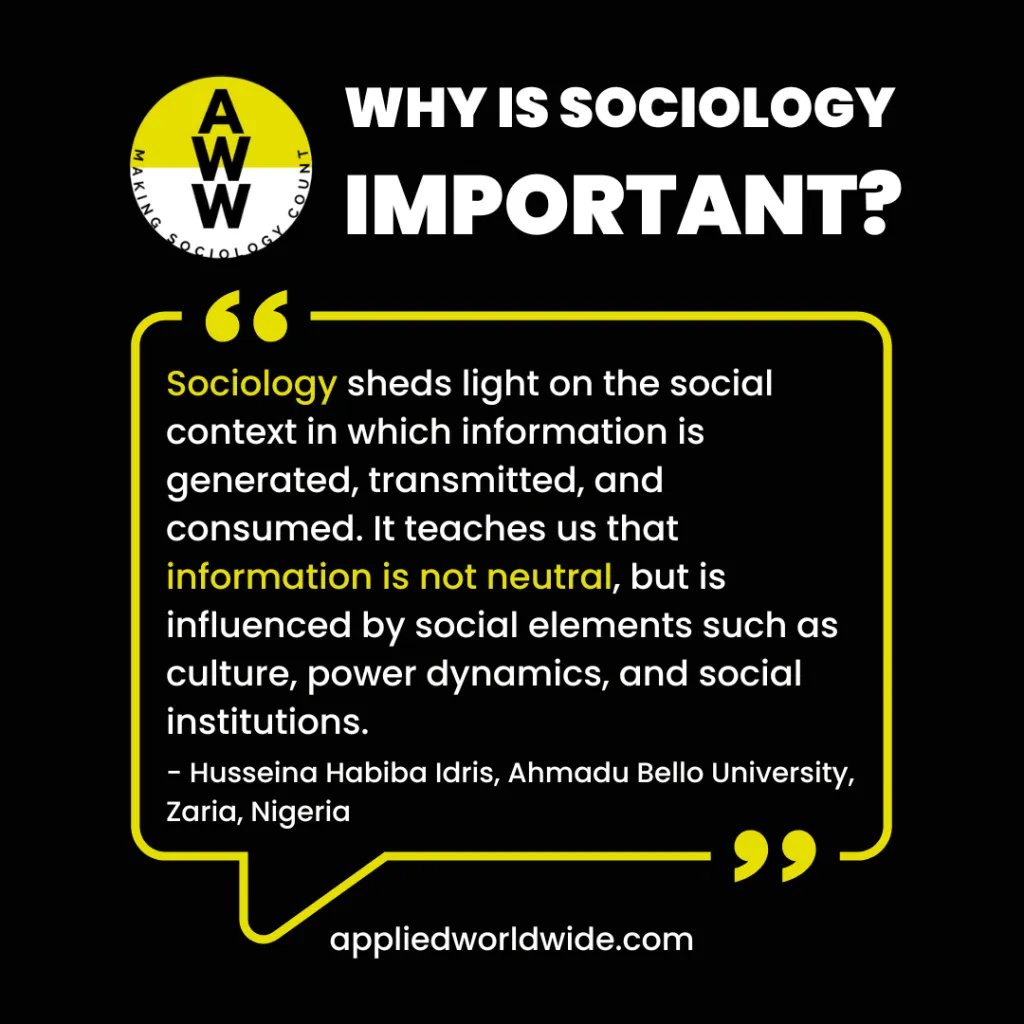
Sociology studies how individuals and societies interact with information and make decisions based on their social and cultural contexts. This knowledge is useful to information workers because it allows us to create user-centered services, understand information-seeking behavior, and support meaningful engagement with information resources.
Sociology focuses on the study of social inequality and the promotion of social justice. Sociological insights assist library and information science professionals in recognizing and addressing discrepancies in information access and usage. Using a sociological lens, information workers can endeavor to ensure that all members of society have equal access to information, regardless of socioeconomic status, cultural background, or other social characteristics.
Social Impact of Information Policies
Sociology provides frameworks for examining the social consequences of information policies and practices. It explains how information regulations impact social structures, power dynamics, and opportunities for individuals and groups. By drawing on sociological viewpoints, information professionals can advocate for policies that enhance social welfare, information literacy, and democratic access to information.
Sociology emphasizes the value of community involvement and empowerment. Information professionals can use sociological ideas to create community-centered programs, encourage collaboration, and empower individuals and groups through information literacy initiatives. This strategy allows us to establish close relationships with communities, understand their individual needs, and collaborate on information services that answer their specific difficulties and objectives. To summarize, sociology, library, and information science are interrelated disciplines that complement one another.
To summarize, the intersection of sociology, library, and information science demonstrates a fundamental synergy between understanding human society and enabling the flow of knowledge within it. This collaboration enables information workers to manage the complexities of social structures, disparities, and dynamics, ultimately promoting inclusivity, social justice, and community participation. By incorporating sociological insights, information workers cannot only improve their understanding of information habits, but also advocate for equal access to information resources and policies that promote societal well-being. Finally, the integration of sociology with library and information science demonstrates a comprehensive approach to serving various populations, enhancing lives, and building a more informed, connected, and equitable society.
Meet our 2024 Global Student Essay Competition Sponsors!
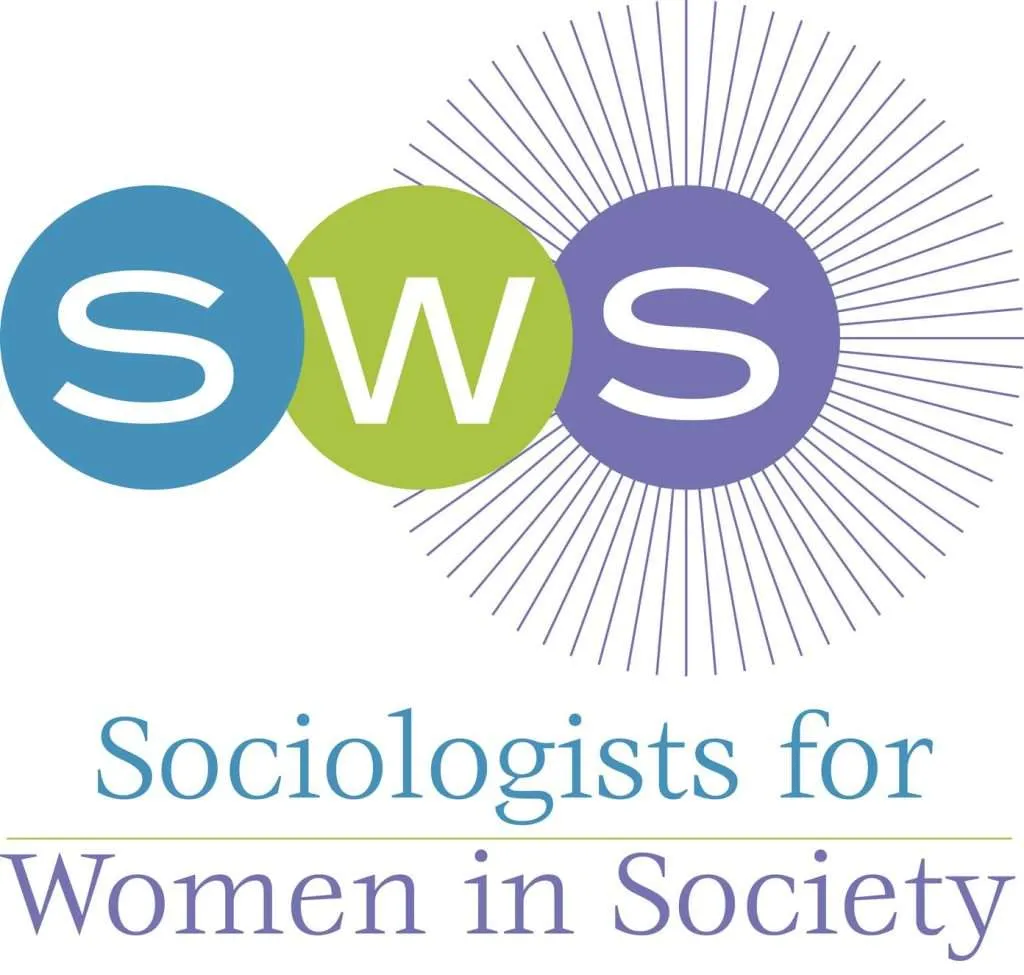
Sociologists for Women in Society is a nonprofit professional feminist organization dedicated to:
- Transforming the academy and professional organizations, including our own, by actively supporting feminist leadership and advancing career development of feminist scholars.
- Recognizing that structural inequalities impact those marginalized by their identities and that this requires proactively promoting the creation of inclusive institutional spaces in an ongoing manner and by practicing critical reflexivity.
- Advocating and encouraging the development of sociological feminist theory rooted in intersectionality and cutting-edge research for publication and dissemination.
- Promoting social justice research within local, national, and international activist spaces by supporting scholar-activist communities seeking to dismantle intersecting systems of oppression.

The Center for Equity Education (CFEE), established in 2020 as a 501(c)(3) nonprofit, addresses a gap in expert-led education for organizations, especially those with limited resources. At CFEE, our mission revolves around empowering organizations with comprehensive knowledge on federal and state civil rights, specializing in harassment and discrimination, including sexual harassment.

Hartman Castle Preservation Corporation, a 501c3 non-profit, is a A community grassroots movement formed to purchase and preserve the Hartman Castle in Gunnison, CO
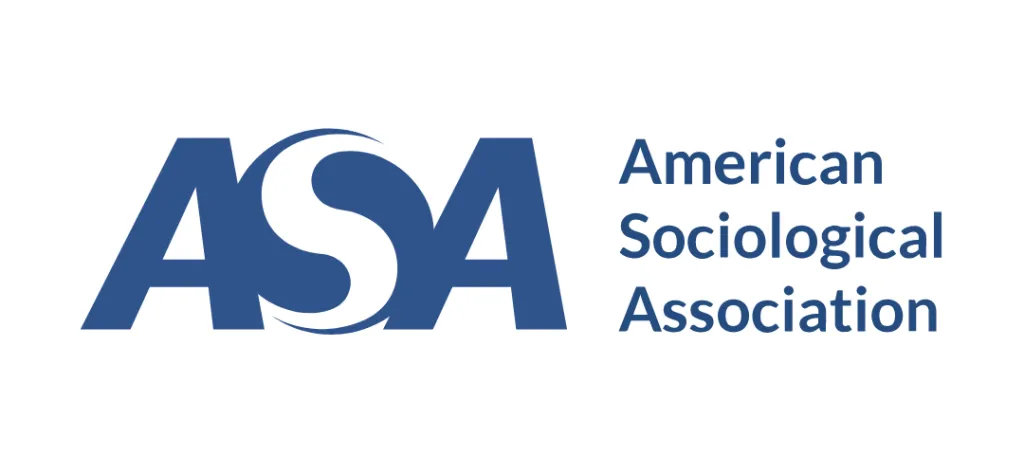
The purpose of the American Sociological Association’s Section on Sociological Practice and Public Sociology is to advance sociologically-informed research and practice, to further public discussion of sociological issues, and to promote the use of sociology to inform public policy.

Island Acres Resort Motel is a restored authentic 1950s lodging property in the style of the tourist court motel. Embracing the appeal of a bygone era, where history blends with hospitality.
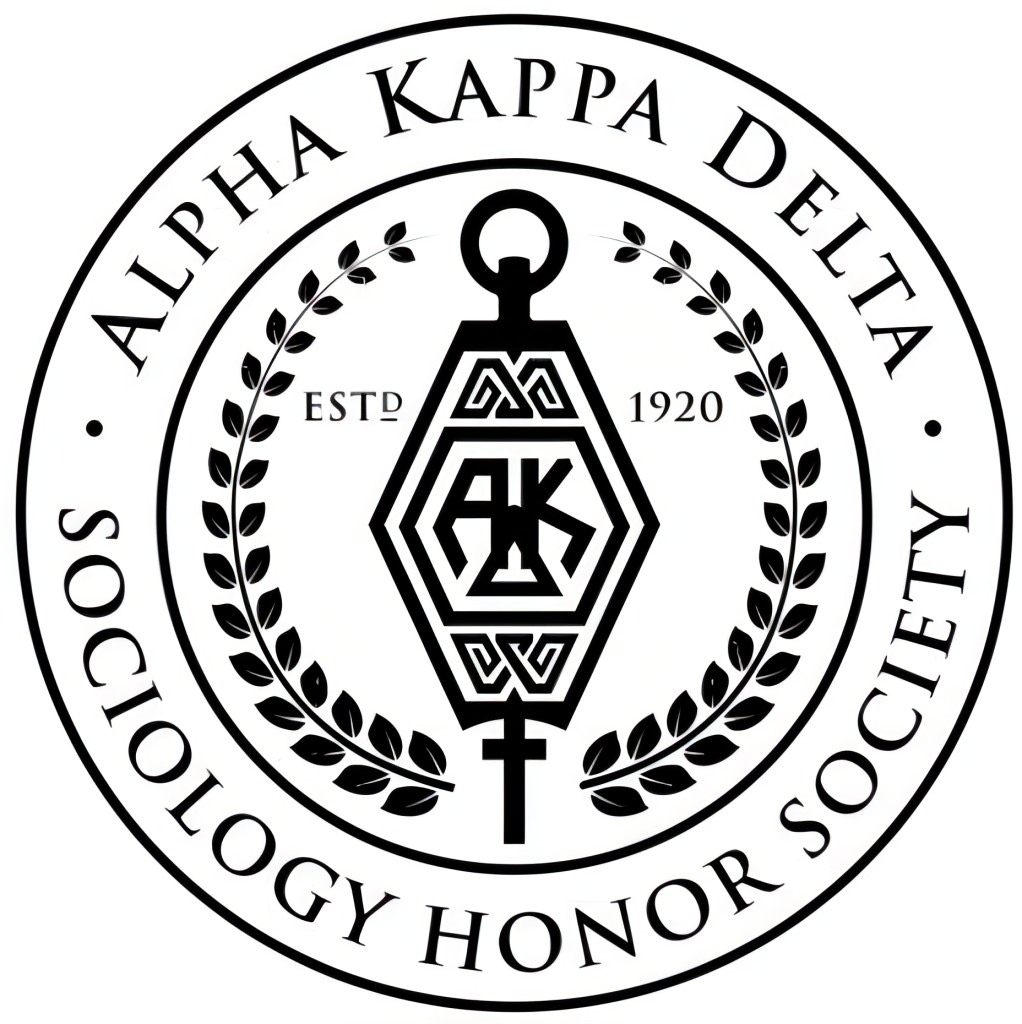
Alpha Kappa Delta, the International Sociology Honor Society, seeks to acknowledge and promote excellence in the scholarship in the study of social problems, sociology, and intellectual activities that lead to the improvement in the human condition.
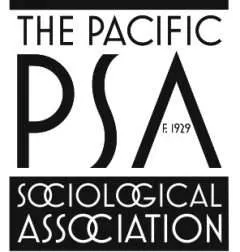
The Pacific Sociological Association is committed to serving sociologists, faculty, applied professionals, and students. We strive to create a professional community that reflects the diversity of our region and enhances the diversity of our discipline. We are committed to inclusivity and equity in our organization, to promoting social justice by examining and challenging the structural and institutional barriers in our discipline, and to building pathways for the next generation of sociologists.

The Association for Applied and Clinical Sociology (AACS) promotes applying social scientific knowledge and methods to develop constructive solutions. We provide educational, programmatic, mentoring, networking, and policy resources in a supportive professional community.

